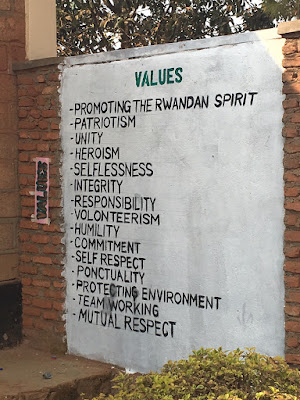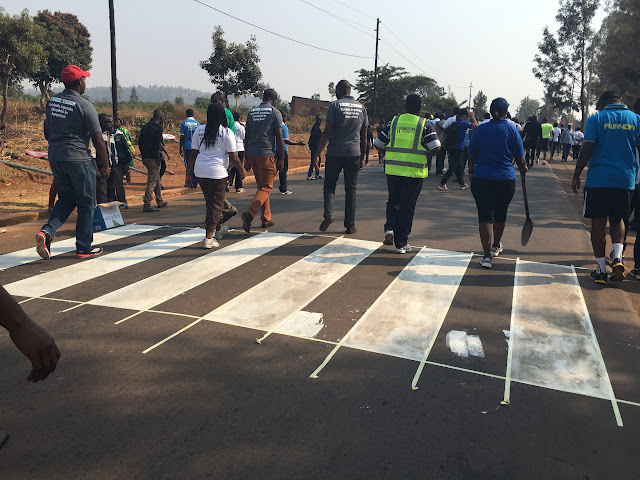I love the concept...neighbors and communities coming together for a common purpose; to care for their surroundings. It's not someone else's problem. It's a matter of pride and responsibility. And once the work is done, the community gathers to discuss various issues.
 |
| Kids watching Umuganda work. Last Saturday of every month, Umuganda is held. It's a community service day, required of all adult citizens, even President Kagame. |
People tell me they generally like the event because it is a way to know their neighbors, and they feel some reward by taking care of their neighborhoods together.
 |
| A wall in the school yard where we experienced Umuganda. |
Unfortunately, our participation in Umuganda was a bust.
We were told we were invited to work alongside the Mayor of Kigali, and that staff from the Korean Embassy would join us. We'd be painting a cross walk for a local school.
But when we stepped out of the bus, there was confusion. Yes, the Koreans were there. They were delighted to see us. But then, they asked politely, why are you here? We said, "to work with you and the mayor."
The expression on their faces said, "Huh?"
Turns out the Koreans had organized the cross walk painting as their own event. They were not expecting us. They mayor of Kigali was not there. They had invited her, and "hoped" she would come. It was clear there was no work for us. Nothing planned or organized.
I asked a man for a hoe. He gladly gave me one. I worked alongside a lady who didn't speak a word of English. She and another lady seemed to find my attempt to use the hoe rather amusing. They acted a bit puzzled as well.
 |
| I worked alongside this lady for a while. She was rather amused at my attempt. |
But in the end, there wasn't enough for us all to do. No tools. It was awkward for the team to stand around and not help. But we were stranded. During Umuganda the streets are closed to traffic. From 8 a.m. to Noon.
 |
| My SAP colleague Martin digs in, helping to remove trash from drainage ditch. |
 |
| This is the way most Rwandans get their clean water. Hauling it to their homes in yellow containers. |
Did I mention how many big hills there are Kigali?
Lots of steep inclines...and it was hot that day. But we made it. Sometimes we would pass people walking to work. Including a young man named Olivier. He started walking with us. He really seemed to want to talk.
Olivier said he has no family--his parents died in the genocide. He told us he is in a program that is funded partially with US aid, which will allow him to go to Kenya to study at university. Part of me didn't buy his story. But, if it's true, it makes me happy to know that he has a chance to be educated and make a life for himself.
The day didn't turn out to be what I'd hoped for. But I'm glad I went to see Umuganda for myself.
 |
| The crosswalk we had hoped to paint. The Koreans got the job done without us. |



